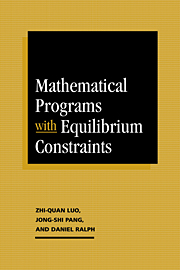3 - First-Order Optimality Conditions
Published online by Cambridge University Press: 05 December 2011
Summary
This is the first of three chapters in which we derive some necessary optimality conditions for the MPEC (1.1.1). This chapter is concerned with the fundamental first-order conditions; Chapter 4 deals with the verification of hypotheses required for these first-order conditions; and Chapter 5 is concerned with the second-order conditions. Although we have seen that the MPEC (1.1.1) can be formulated as a standard nonlinear program via the KKT formulation of the inner VIs (see, e.g., Theorem 1.3.5), for reasons to be given in this chapter a straightforward application of the optimality conditions in classical nonlinear programming is inappropriate.
One approach to deriving optimality conditions of an MPEC is to use a differentiable exact penalty equivalent of the problem, such as (2.4.7) or (2.4.10), and apply classical results to such a formulation. A drawback of this approach is that strong assumptions are required for the MPEC to be equivalent to a differentiable constrained optimization problem; see Theorem 2.4.7. Even in the case of the MPAEC (Theorem 2.4.4), the equivalent formulation requires the restrictive nondegeneracy assumption. For the MPAEC, one could use the less restrictive Theorem 2.4.3; although the min function is nondifferentiable, it is simple enough to make the formulation (2.4.6) a viable candidate for this purpose; see Subsection 2.4.3. Proposition 2.4.9 provides a preliminary set of necessary conditions for a local minimum of the MPAEC.
In this chapter, we abandon the exact penalty function approach for the derivation of optimality conditions of MPEC. Instead, we resort to first principles to understand the stationarity conditions and the tangent cone of the feasible region of MPEC. The chapter contains four sections.
- Type
- Chapter
- Information
- Mathematical Programs with Equilibrium Constraints , pp. 113 - 144Publisher: Cambridge University PressPrint publication year: 1996

